Related Research Articles

Biotechnology is a multidisciplinary field that involves the integration of natural sciences and engineering sciences in order to achieve the application of organisms, cells, parts thereof and molecular analogues for products and services.

Rothamsted Research, previously known as the Rothamsted Experimental Station and then the Institute of Arable Crops Research, is one of the oldest agricultural research institutions in the world, having been founded in 1843. It is located at Harpenden in the English county of Hertfordshire and is a registered charity under English law.

The Commonwealth Scientific and Industrial Research Organisation (CSIRO) is an Australian Government agency responsible for scientific research.
Paul William Wellings CBE DL FRSN FRSA FAICD is an Australian/British ecologist and long serving university leader. He is notable for his past service as Vice-Chancellor of University of Wollongong (2012-21), Vice-Chancellor of Lancaster University (2002-12) and Deputy Chief Executive of Australia's Commonwealth Scientific and Industrial Research Organisation (1999-2002).
SemBioSys Genetics Inc. was a development stage agricultural biotechnology company. It utilized its patented safflower pharming platform to develop and make proteins and oils for the nutraceutical, functional food and beverage, and pharmaceutical industries. A University of Calgary spin-off (1994), SemBioSys became a publicly traded firm. Investors had included Bay City Capital, the Business Development Bank of Canada, Dow AgroSciences, Royal Bank Ventures Inc., the University of Calgary, Ventures West Capital Ltd., and Dr. Maurice Moloney. In May 2012, SemBioSys terminated its operations.

Jiří Petr, Prof., DrSc. Dr.h.c. was a Czech agroscientist, university professor and Emeritus Chancellor of the Czech University of Agriculture Prague.
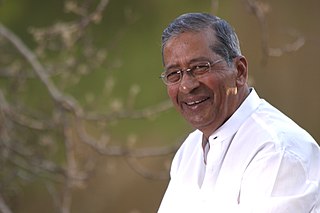
Bhavarlal Hiralal Jain was an Indian entrepreneur, hounered by the Padma Award, Government of India, and the founder chairman of Jain Irrigation Systems Ltd. (JISL), now the second largest micro-irrigation company in the world. He was a staunch Gandhian and philanthropist. He was the founder of Gandhi Research Foundation.

William Arthur Stewart Buxton is a Canadian computer scientist and designer. He is regarded as one of the pioneers in the field of human–computer interaction and is currently active in research at the University of Toronto. He is especially known for his curation of his collection documenting the history of interactive devices. He was a partner researcher at Microsoft Research before leaving in December 2022.
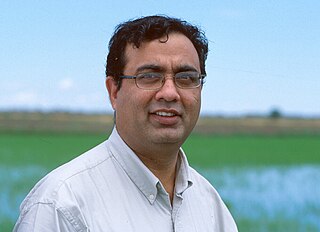
Shahbaz Khan is an Australian climatologist and hydrologist, who has worked extensively for UNESCO and also advised governments and universities on issues related to the climate and water management.
Charbel Farhat is the Vivian Church Hoff Professor of Aircraft Structures in the School of Engineering at Stanford University, where from 2008 to 2023, he chaired the Department of Aeronautics and Astronautics. From 2022 to 2023, he chaired this department as the inaugural James and Anna Marie Spilker Chair of Aeronautics and Astronautics. He is also Professor in the Institute for Computational and Mathematical Engineering, and Director of the Stanford-King Abdulaziz City for Science and Technology Center of Excellence for Aeronautics and Astronautics. From 2017 to 2023, he served on the Space Technology Industry-Government-University Roundtable; from 2015 to 2019, he served on the United States Air Force Scientific Advisory Board (SAB); from 2008 to 2018, he served on the United States Bureau of Industry and Security's Emerging Technology and Research Advisory Committee (ETRAC) at the United States Department of Commerce; and from 2007 to 2018, he served as the Director of the Army High Performance Computing Research Center at Stanford University. He was designated by the US Navy recruiters as a Primary Key-Influencer and flew with the Blue Angels during Fleet Week 2014.
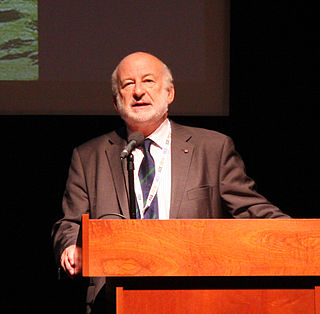
John Anthony Pickett CBE DSC FRS FLSW is a British chemist who is noted for his work on insect pheromones. Pickett is Professor of Biological Chemistry in the School of Chemistry at Cardiff University. He previously served as the Michael Elliott Distinguished Research Fellow at Rothamsted Research.

Maurice Paul Nivat was a French computer scientist. His research in computer science spanned the areas of formal languages, programming language semantics, and discrete geometry. A 2006 citation for an honorary doctorate (Ph.D.) called Nivat one of the fathers of theoretical computer science. He was a professor at the University Paris Diderot until 2001.
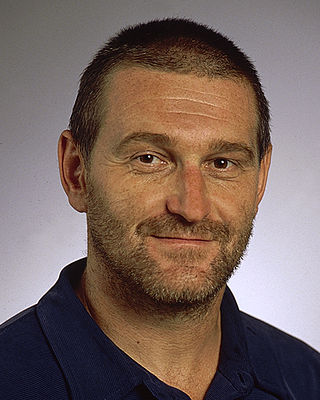
Pavel Arkadevich Pevzner is the Ronald R. Taylor Professor of Computer Science and director of the NIH Center for Computational Mass Spectrometry at University of California, San Diego. He serves on the editorial board of PLoS Computational Biology and he is a member of the Genome Institute of Singapore scientific advisory board.
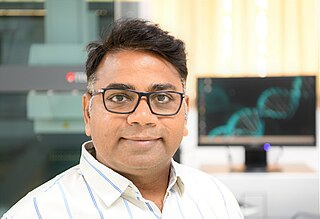
Rajeev Kumar Varshney is an Indian agricultural scientist, specializing in genomics, genetics, molecular breeding and capacity building in developing countries. Varshney is currently serving as Director, Western Australian State Agricultural Biotechnology Center; Director, Centre for Crop & Food Innovation; and International Chair in Agriculture & Food Security with the Food Futures Institute at Murdoch University, Australia since Feb 2022. Before joining Murdoch University, Australia he served International Crops Research Institute for the Semi-Arid Tropics (ICRISAT), a global agriculture R&D institute, for more than 16 years in different scientific and research leadership roles including Research Program Director for three global research programs– Grain Legumes, Genetic Gains and Accelerated Crop Improvement Program. He has the onus of establishing and nurturing the Center of Excellence in Genomics & Systems Biology (CEGSB), a globally recognized center for genomics research at ICRISAT that made impacts on improving agriculture and development of human resources in several countries including India, China, Kenya, Ethiopia, Tanzania, Nigeria, Ghana, Mali, Senegal, Burkina Faso, etc. Varshney holds Adjunct/Honorary/Visiting Professor positions at 10 academic institutions in Australia, China, Ghana, Hong Kong and India, including The University of Western Australia, University of Queensland, West Africa Centre for Crop Improvement, University of Hyderabad, Chaudhary Charan Singh University and Professor Jayashankar Telangana State Agricultural University.
Cyril Harold Goulden was an eminent Welsh/Canadian geneticist, statistician and agronomist who earned his PhD at the University of Minnesota under the supervision of Herbert Kendall Hayes. He also studied briefly with Ronald Fisher at Rothamsted Experimental Station.
Asis Datta is an Indian biochemist, molecular biologist and genetic engineer, known for his research on genetically modified foods and food nutritional security. He was the founding Director of the National Institute of Plant Genome Research and is credited with the discovery of genes that assist in extended preservation of fruits and vegetables. He is a recipient of the Shanti Swarup Bhatnagar Award, the highest Indian award and in the Science category, and was awarded the fourth highest civilian award of the Padma Shri, by the Government of India, in 1999. In 2008, he was included again in the Republic Day Honours list for the third highest civilian honour of the Padma Bhushan.
Satish Chandra Maheshwari (1933-2019) was an Indian botanist and a former professor at the University of Delhi. He is known for his contributions to the fields of plant physiology and plant molecular biology. Maheshwari is an elected fellow of the Indian Academy of Sciences, the Indian National Science Academy and the National Academy of Sciences, India. The Council of Scientific and Industrial Research, the apex agency of the Government of India for scientific research, awarded him the Shanti Swarup Bhatnagar Prize for Science and Technology, one of the highest Indian science awards, in 1972, for his contributions to biological sciences. He died from lung cancer on June 12, 2019.
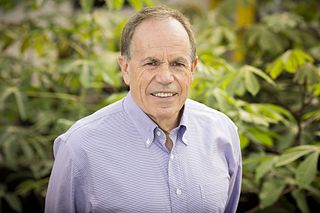
Stephen Patrick Long is a British-born American environmental plant physiologist and member of the National Academy of Sciences studying how to improve photosynthesis to increase the yield of food and biofuel crops. He is the Stanley O. Ikenberry Chair Professor of Plant Biology and Crop Sciences at the University of Illinois and Distinguished Professor in Crop Sciences at Lancaster University. His work, published in Science, proved that photosynthesis can be manipulated to increase plant productivity—an idea once considered the holy grail of plant biology. Long has added to our understanding of the long-term impacts of climate change, such as rising levels of carbon dioxide and ozone on plants. He has briefed former President George W. Bush and the Vatican, as well as Bill Gates and Anne, Princess Royal, on food security and bioenergy.

Marko Sarstedt is a German academic and a marketing researcher. He is a Full Professor at the Ludwig Maximilian University of Munich and Adjunct Research Professor at Babeș-Bolyai-University.
References
- ↑ "U of S awarded $37.2 to design crops for global food security". Ag-West Bio. 29 July 2015. Retrieved 25 November 2019.
- ↑ "University of Saskatchewan gets biggest federal research grant ever | CBC News".
- ↑ "Professor Maurice Moloney to join the Commonwealth Scientific and Industrial Research Organisation (CSIRO)".
- ↑ "Rothamsted Research - Powerbase".
- ↑ "Rothamsted and Syngenta announce a multi-million pound scientific partnership - Cambridge Network". www.cambridgenetwork.co.uk. Archived from the original on 3 January 2019.
- ↑ "Ploughing a lonely furrow for GM crops".
- ↑ SemBioSys website
- ↑ Botaneco website
- 1 2 "Professor Maurice Moloney". Rothamsted Research. Archived from the original on 11 July 2012. Retrieved 7 April 2012.
- 1 2 BBSRC press release 14 January 2010
- ↑ "New Director for Rothamsted Research". Rothamsted Research. 14 January 2010. Archived from the original on 2 June 2012. Retrieved 6 April 2012.
- ↑ "Honorary Graduates July 2013 | Lancaster University".